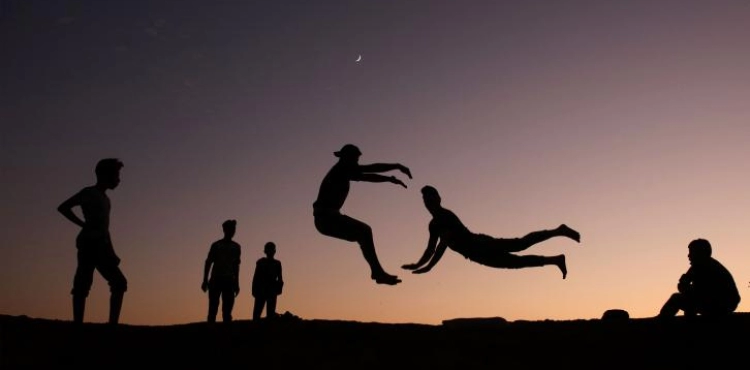The new Coronavirus disease (Covid-19) crisis has negative repercussions on various aspects of life in the Gaza Strip, without even children finding themselves facing the spread of the disease and conditions of closure.
For the twelfth day in a row, the child Khaled Ahmed from the town of Beit Lahia in the northern Gaza Strip was unable to meet his mother, who was infected with Coronavirus.
Ahmed´s mother receives treatment and medical care in a quarantine center, which is supervised by government authorities run by Hamas.
The thirtieth, Abd al-Rahman Ahmad, Ahmad´s older brother, says that his brother has lived in complete isolation from them since the departure of his mother, pointing out that he refuses to play or merge with us.
Ahmed added that his brother "does not stop crying for long hours, and he refuses to talk to anyone other than his mother, who he usually speaks to on the mobile phone."
Ahmed complains that there are no awareness programs for the parents of the children to enable them to behave in a correct way with those who suffer from psychological problems due to the changing circumstances around them.
A series of strict measures and restrictions were imposed to prevent the spread of the disease among the population, including declaring the complete closure of all government and educational institutions and preventing public gatherings and movement between governorates.
Under the pressure of the economic deterioration, the closure measures were eased after several weeks, including the gradual reopening of schools, as secondary and middle school students are allowed to attend school hours according to preventive measures.
Families say that their children live in a "real prison", and that they are deprived of practicing their normal lives, in addition to not having any means of entertainment that relieves them of psychological pressure.
This is what the girl Ghazal Muhammad (10 years old) suffers from isolation and introversion, in addition to her violent reactions to the simplest behavior, according to her mother, Samiha Subuh.
Ghazal, the middle daughter of five sisters, was unable to continue her school hours due to the significant increase in the number of injuries in the Gaza Strip.
Ghazal complains that she "no longer plays with her friends at school and does not practice her normal life as it was before the closure."
Her mother, Samiha Subuh, says that the instability of the situation in Gaza and the fact that students are allowed to return to their schools while preventing others, was a major reason for changing some of the behaviors of 3 of her daughters.
She adds, "Unfortunately, Ghazal and two of her sisters have become more isolated and introverted, as well as more violent in their reactions to some actions, and more stubborn compared to their condition before the closure period."
The mother complains that her children spend most of their time playing on mobile phones, or watching television without playing with each other.
The situation is different, however, in an area like the Shati refugee camp, which is crowded with very poor homes.
Child Sameh Hamdouna spends most of his time playing with his peers among the alleys of the camp without following preventive measures such as wearing a muzzle or maintaining social distancing.
The child´s mother, Angham Hamdouna, is afraid of her son becoming ill because he spends more time on the street with his friends.
Hamdouna, a mother of four, says that she was unable to control her child and keep him at home, as was the case during the first closure period imposed by the Hamas government in late March.
She added, "It seems that the situation is getting worse in the Gaza Strip, which suffers from woes of poverty and unemployment. We do not know what to do in raising our children who have become more stubborn and distant from us."
The sector has witnessed a remarkable increase in the number of cases of Coronavirus disease in recent days, as the Ministry of Health today recorded 600 cases and 4 deaths.
And the Ministry of Interior in Gaza warned of the possibility of returning to imposing a comprehensive closure if the casualty index continues to rise, and if the residents do not adhere to preventive measures.
Psychologist Dardah Al-Shaer says that the children are the most affected by the repercussions of the spread of Corona in Gaza, as the closure caused the interruption of their communication with education.
This negatively affects their social relations as well as their psychological status, according to the poet.
He indicates that the nature of children lies in discharging their energies through play and social interaction with their peers, and depriving them of the basics of life for them will have negative effects such as resorting to isolation or violence.
Al-Shaer believes that the measures taken by the ruling authorities to limit the spread of the virus were a "strategic mistake", explaining that they did not contribute to limiting the spread.
Al-Shaer fears the continuation of the current situation or the worse, pointing out that this will have a negative impact on the upbringing of a generation of vulnerable children because of their deprivation of their basic needs.
The psychologist stresses the need to remedy the situation of childhood in Gaza by the ruling authorities and to take precautionary measures that do not prolong the separation of children from the surrounding environment.
Almost half of the residents of the Gaza Strip are children, the majority of whom live in precarious conditions, according to statistics issued by the Palestinian Central Bureau of Statistics.












